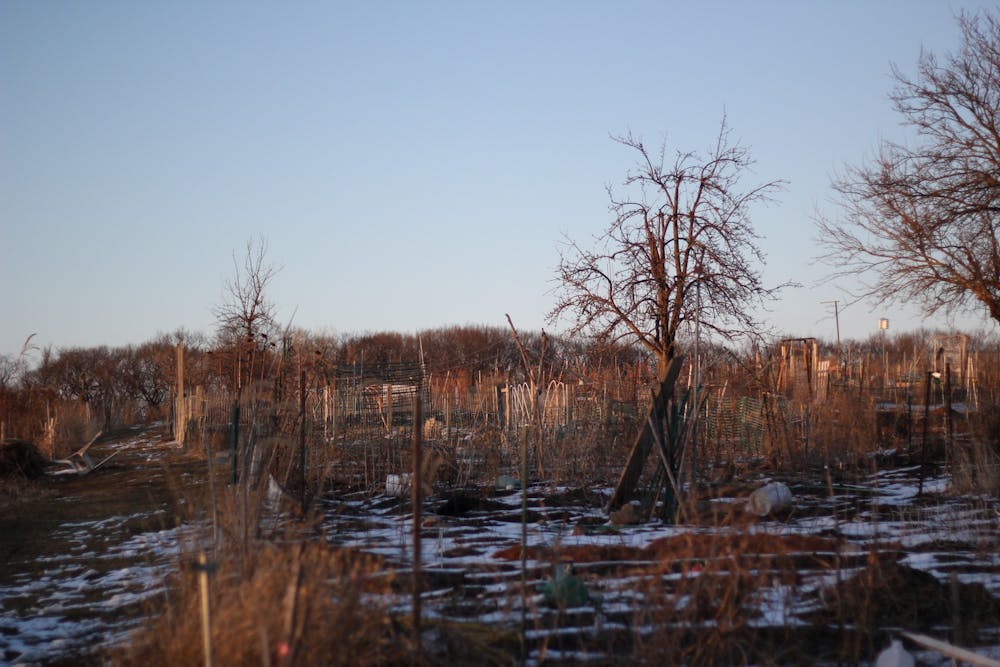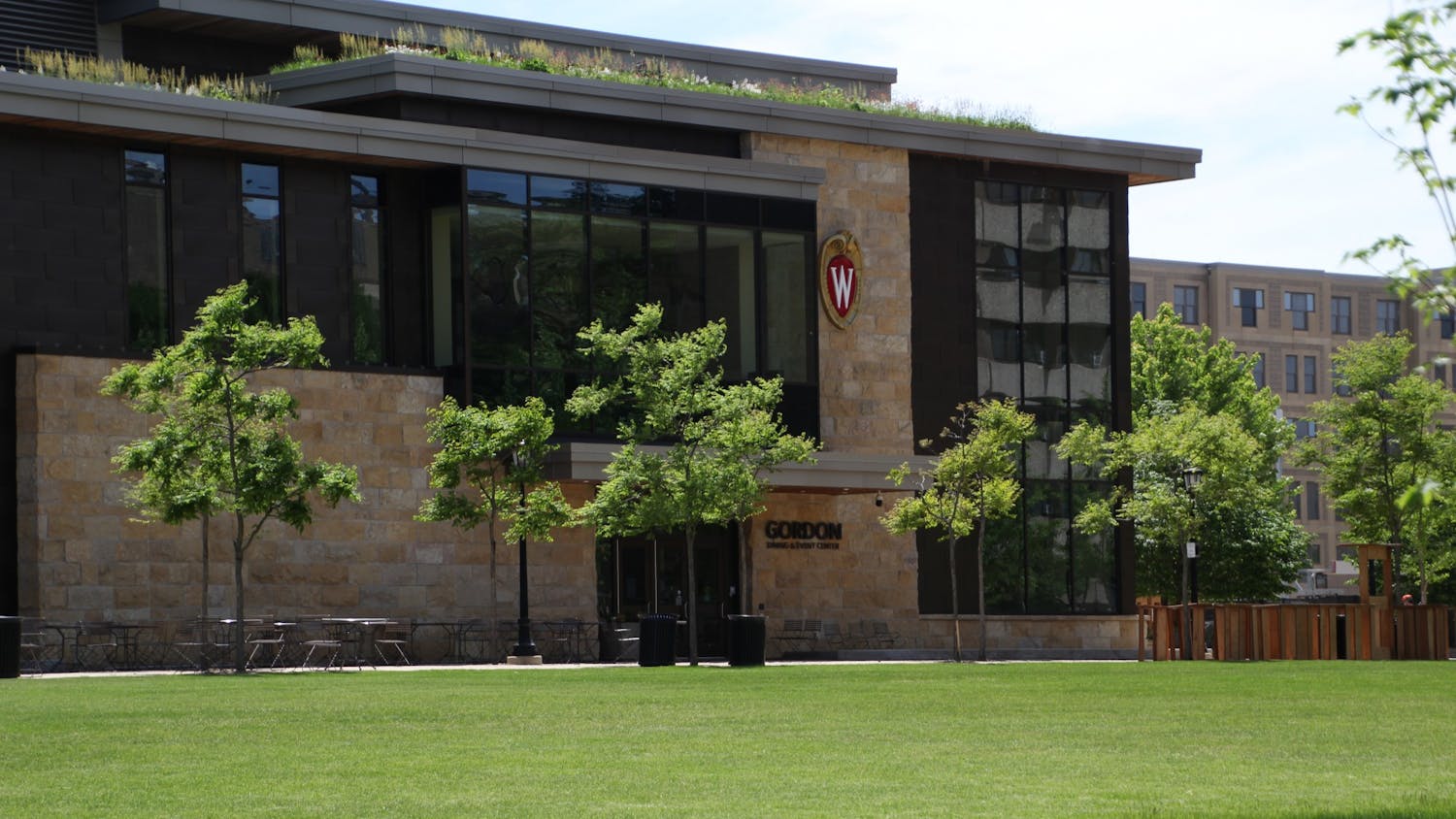While the Wunk Sheek community garden is not the first student garden in the University of Wisconsin-Madison’s history, or even the first in the Wunk Sheek’s history, it is certainly one of the newest — planted for the first time just this past summer.
Even coated with a new layer of snow, the beauty of the garden is not lost. It stands as a testament to the enduring legacy of the student organization.

Formed in 1968 to serve the Indigenous population at UW-Madison, Wunk Sheek is dedicated to cultivating and celebrating interest in Indigenous issues, culture and history. The name is derived from a Ho-Chunk word meaning “Native people.”
The way Wunk Sheek serves its members can be different for everyone, Wunk Sheek President Paige Skenandore explained, and the question of the organization’s personal impact is best left to every individual within it. It’s hard, she says, to boil down an organization to a small soundbite, but the best way to describe it is “a home away from home,” because it is “the foundation of your Native network of your family and friends on campus.”
Environmental chair Daniel Hayden built upon this, explaining that the family the organization strives to create is built with people who are communally based and community minded, and can be an integral part of success for students who struggle to be away from home.
"[For] people who are communally inclined and based in their worldview perspective, having that community can obviously be important,” Hayden said about Wunk Sheek. “It can really be significant in their success at university, so it’s really like that important home and family.”
Wunk Sheek has four programs. The garden program is the newest, called Growing Together, and while all leadership within the organization works on all the programs as a collective, it is closely tied in with Hayden’s position.
“[The program is] focused on the garden, getting seeds in and having a good growing season, but it’s also got room for other events,” Skenandore said. She described cooking classes and other community get-togethers that work towards the required number of events that Wunk Sheek needs for each program.

Courtesy of Wunk Sheek.
Skenandore noted Wunk Sheek’s focus on the environment and sustainability, and the importance of Indigenous students connecting as a community to the environment. In the case of the garden, it serves as an augmentation of this sentiment.
This is the second Wunk Sheek student garden. The first garden, also at Eagle Heights, sort of “fizzled out” after a shuffle of leadership and a reformatting of the programming within the organization, Skenandore revealed.
The student group is now making arrangements to ensure that this garden becomes a more permanent fixture in the community gardens. Central to this is supporting the food sovereignty movement that has deep roots in Madison, according to Hayden.
The food sovereignty movement is a ground-up approach that focuses on placing control of policies regarding food production and distribution in the hands of the people who do the producing and distributing, according to the U.S. Food Sovereignty Alliance. Almost every tribe in the state of Wisconsin has been involved in protecting food systems at every level, Hayden explained.
“Every student sort of has that connection [to food sovereignty], but then there wasn’t really a place here, obviously, where we were able to grow foods or do anything like that,” Hayden said.
The garden is a way to serve Indigenous students on campus by connecting them to this part of Indigenous identity, Hayden added.
Skenandore and Hayden had other ideas for ways to involve UW-Madison students in the community, and Eagle Heights Community Gardens had been looking for ways to diversify their garden and serve groups that had been underrepresented in the plots there. Wunk Sheek was offered a garden space, and the organization was able to use plans for an Indigenous garden that had already been their goal to start planting in June of 2021.
“They were trying to diversify the crops as well as the people out there,” said Hayden, underscoring that the addition of the Wunk Sheek garden would help the community gardens move away from being mostly research-based and more towards being centered on the community.
Wunk Sheek’s goal is to make sure that this garden becomes a permanent part of the community gardens, and they’ve already begun talks to figure out how to make that vision a reality. Because they began planting so late in the season last year, they didn’t get the chance to have volunteers come out to help decide what to grow and where on their plot to grow it.
They are now setting up a sign-up and volunteer rotation sheet so that students that want to get involved this year are able to.
Similar to the first garden planted by Wunk Sheek, tobacco was the first crop planted in the new garden as part of the Growing Together program. Ho-Chunk corn seeds were also donated to the organization from other gardens in the area to plant.
Hayden described the assortment of seeds available to him through his research with the plant pathology department that were planted in the plot, and other students in the organization had seeds given to them from their homes and families to plant in the garden.
The diversity of crops and their origins served as a way to bring a bit of home to the Indigenous students who might be far from where they grew up, though the garden ended up being mostly corn. Historically, the main crop in this area was corn, Hayden said, so it would make sense for the garden to look that way.
“The seeds and the stuff that we’ve planted in the garden have definitely shaped my identity,” Skenandore revealed. “My grandparents have always had white sage, just all around their yard, so that’s always been a big thing for my family.”
Hayden continued, saying that having the ability to bring these little bits of history to campus can help Native students feel a little more grounded, where they may have struggled with being far away from home, or even just students who wanted to bring their lives into the community on campus.
He described how giving students who would like to connect with their identities through gardening a welcoming place to do that is an important step. Allowing students more than one way to express themselves culturally is a massive part of feeling more connected and being more at home.
“I’m Native; I’m not from Wisconsin so this is my outside, sort of, perspective on this, but ... the idea of food sovereignty, it relates to everything,” Hayden said. “I think we’re finding that out more, like these workshops, and everything like that with Wunk Sheek; it’s all connected.”
The garden as a work in progress also has an effect on students' identities, Skenandore continued, going off the idea of personal understanding as a fluid idea, rather than something that is formed and then solidified.
“It’s still a work in progress,” Skenandore said. “I think the garden can impact our members’ identities, and has. I know it has really inspired a lot of careers, and really brought people into the environmental major all together.”






